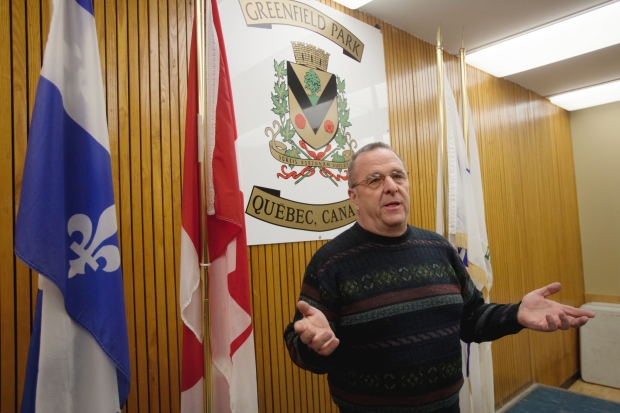MONTREAL — Longueuil is quietly throwing its support behind municipalities fighting a bill that threatens to strip many Quebec towns of their bilingual status.
The South Shore city of 230,000 is not officially bilingual but its borough Greenfield Park is.
On Tuesday, Longueuil issued a statement by Greenfield Park calling on the provincial government to maintain the borough’s bilingual status.
“The recognition of bilingualism in Greenfield Park is fundamental, since it attests to the presence and historical importance of the anglophone and francophone communities in the borough,” borough chairman Michael O’Grady said in the statement.
“We oppose any change to the law that could lead to the disappearance of this recognition and favour maintaining the status quo to protect the identity of our community,” he added.
The resolution — unanimously approved by the borough council Monday night — is in response to Bill 14, the Parti Québécois government’s proposed law to tighten up the province’s French language charter.
Under the proposed law, tabled in December, the government could revoke a municipality’s bilingual status if its mother-tongue English-speaking population drops below 50 per cent. That means it would lose the right to use both official languages, for example, on signs, in the names of municipal departments and services, on websites and in written communications.
Consultations will be held on the bill next month and the deadline for submitting a brief or register to appear is Monday.
Losing bilingual status “would be a big blow to the citizens of Greenfield Park,” said councillor Robert Myles of the opposition Parti municipal de Longueuil, who supported the resolution. Once mainly English-speaking, the town of 16,920 kept its bilingual status when it was merged with Longueuil in 2002. Now, just 31 per cent of the population has English as its mother tongue, including bilinguals.
But Myles said that’s no reason to yank the borough’s bilingual status. “If something’s going well, why break it?” he said.
In recent weeks, communities from the Gaspé to the Ottawa Valley have passed motions calling on the government to keep its hands off their bilingual status.
About half of the 86 cities, towns and boroughs that currently enjoy bilingual status have already passed resolutions condemning the proposed law, said Côte-St-Luc Mayor Anthony Housefather, who is co-ordinating municipal opposition to the bill.
They include Hampstead, Montreal West, Town of Mount Royal, Senneville, Beaconsfield, Dorval, Baie d’Urfé, Pointe-Claire, Kirkland and Westmount, along with several towns in the Eastern Townships and other regions, like Ayer’s Cliff, Shawville and Gore.
“There’s nothing good that I can say about this bill,” Housefather said.
“It’s a bill that’s not needed. It simply makes it uncomfortable for the English-speaking community in Quebec,” he added.
Under the bill, the Office québécois de la langue française would be required to review municipalities’ eligibility every 10 years.
At the time of the municipal mergers in the early 2000s, the Quebec government tightened up the requirements for bilingual towns by basing eligibility on the proportion of mother-tongue anglophones; it used to be based on the proportion of non-francophones. Critics say that makes it increasingly difficult for towns to retain their status, as the proportion of native-born anglophones in the population declines.
In December, Quebec International Relations and Francophonie minister Jean-François Lisée said the government was prepared to be flexible, for example by dropping the benchmark to 40 per cent.
But O’Grady said the point is not the proportion of anglos required to retain bilingual status: it’s rather the prospect of having the government unilaterally remove it.
“All we’re saying is why don’t you leave municipalities to figure this out for themselves and not have a nameless, faceless bureaucrat sending a letter from the Office de la langue française to say that we no longer qualify and that our bilingual status should be removed,” he said.
“I feel that the communities should be empowered to decide this for themselves based on their conditions and their realities,” he added.
Longueuil Mayor Caroline St-Hilaire, a former Bloc Québécois MP and deputy house leader, helped draft the resolution, O’Grady said.
“She supports that resolution because we worked on it as a team,” he said.
St. Hilaire was not prepared to comment publicly on the issue because only the borough has voted on it, said the mayor’s press attaché, Catherine Bérubé.
Longueuil council will vote on whether to support the borough’s resolution at its next meeting on Feb. 19, O’Grady said.
Grady said there is widespread support for his borough’s stance, and not just among anglophones.
“We’re hoping that everybody will unanimously support our community because it will make a strong statement and it will allow us to get on with the job of dealing with the dossiers that are critical to the advancement of the whole city,” he said.
“This type of conflict is unproductive and unwanted just as much by francophones as by anglophones,” he added.
Bilinguisme à Longueuil
Greenfield Park gears up for a fight



























Laissez un commentaire Votre adresse courriel ne sera pas publiée.
Veuillez vous connecter afin de laisser un commentaire.
Aucun commentaire trouvé